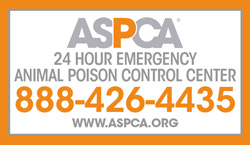How to puppy proof your house | Dr. Justine Lee
Ah puppies. So cute, with their soft fur and puppy breath. However, with those pros come the cons of curiosity.
As I deal with puppy training, sleepless nights, and the joys of puppy ownership, I reflect back on how “easy” it was to have a geriatric, well-trained older pooch! In hind sight, I haven’t had a puppy in over 14 years! My previous pit bull, JP, was very well trained and hence never got into anything bad… In other words, my house wasn’t appropriately puppy poison-proof for my newest puppy addition, Milo.
Apparently, our younger, untrained dogs are most at risk for home-poisonings. At ASPCA Animal Poison Control Center, a non-profit animal poison control based out of Urbana, IL, the average or typical clientele is a puppy or young dog (1-3 years of age). Older, wiser dogs are more trained and less curious, and hence, are less likely to get into poisons to the same degree as younger dogs.
So, now that I have a puppy in my house, I had to go about pet-proofing. Here, the top 15 steps you must do to make sure your house is dog proof!
- Crate train your dog appropriately. While some people may view this as “cruel” to lock their dog up all day, it’s actually more humane. When done correctly, dogs view the crate as their den, and will often sleep in it even when you’re home at night!
- Don’t put your human medications next to your dog’s medications. Pet owners often accidentally take their dog’s pill, only to pill their dog their human medication. This is more likely to occur in pets on chronic medication (e.g., for years).
- Store medications in elevated, secure cabinets (e.g., bathroom cabinet, kitchen cabinet)
- If you have a “nose-y” dog, make sure to install baby locks on cabinets that house cleaning solutions.
- Don’t store your medications in plastic zipper bags. People often do this before they travel (and they are already frazzled and stressed pre-vacation!), only to throw the bag of medications into their suitcase on their floor. This is very easy for a dog to chew into, and can result in severe poisoning, as your dog ingests several days worth of medication at once. What’s worse? You can’t identify the pills or mg strength because they aren’t in their original container!
- Keep your purse (and its dangerous contents like xylitol sugar free gum, prescription medications, ibuprofen containers, asthma inhalers, birth control pills and coins inside) out of your pet’s reach by simply hanging it up!
- Put the lid down. If you use automatic or clip-on toilet bowl cleaners, this is particularly important, so your pet doesn’t drink the contaminated water.
- Store your trash can in the pantry – or in the least – make sure it has a tight, secure lid on it!
- Weekly pill containers – get rid of them. While this may seem easier for you (especially if you are on a lot of multivitamins, blood pressure medications, water pills, etc.), these plastic containers rattle and sound and look like a dog toy! If you use them, keep them elevated and out of reach of your dog.
- Fence off your compost – when ingested by pets and wildlife, it can result in severe tremors, secondary hyperthermia, and seizures!
- If you own a pet, don’t use mouse or rat poisons – accidental ingestion by your pets can result in internal bleeding, cerebral edema, acute kidney failure, or severe gastrointestinal signs, depending on what type of poison is ingested.
- Keep your pet out of the garage – gasoline, motor oil, antifreeze, windshield wiper fluid, tikki torch oil all pose dangers to your pet. As little as a few teaspoons of antifreeze can result in severe, irreversible kidney failure and death.
- Keep electronic cords hidden behind furniture or carpet. Biting into a cord can result in burns to the mouth and severe fluid accumulation into the lungs.
- Pre-program your cell phone with the phone numbers of your veterinarian, emergency veterinarian, and ASPCA Animal Poison Control Center!
- Download a free, awesome app from ASPCA Animal Poison Control Center advice on what’s poisonous in your household!
Any other experienced pet owners out there with some good pet-proofing tips?
As previously published on www.PetHealthNetwork.com.



Like with most puppies it’s highly recommended that you start training these dogs from as young as 8 weeks old. You’ll later thank yourself down the road for doing it!
There are many online training courses that allow you to train your dog from the comfort of your home. I highly recommend brain training for dogs as a great place to start, you can check out my complete review of the program for more details.
Sarihpur